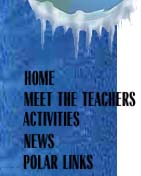|
TEA Collaborative Learning Group
FINAL Report
Youngman
Back to Login Page
| Name of Team Member: | | Total Collaborative Hours: |
| Alexis Martel | | 192 |
| Adrienne Bonnet | | 142 |
| Marti DeAnguera | | 115 |
| Liz Dann | | 15 |
| Linda Hubbard | | 15 |
Overall, in what ways did your collaboration with your team impact your professional growth? (e.g., how did this work impact your approach to and understanding of: content knowledge, pedagogy, process of science, teaching standards, use of technology, etc.)?
This has been and continues to be a tremendous experience for me. I grew in so many ways as a result of being in the TEA program. From the initial application process to the community outreach everything I have done in the past 5 years has been a learning experience. Once chosen for the program and matched with Roger Bales, I began learning the details of a topic I previously had only scratched the surface of. Visiting, interacting with and working amongst scientists inspired and intimidated me. As I became more conversant in their language I grew in self-confidence and in my science content knowledge. My field summer in Greenland took me out of my comfort zone and forced me to understand the true rigors of scientific accuracy and precision. I returned to school in the fall of 2001 charged up about how to teach students the instruments and methods of science including lab books and technology.
Building interesting pages for the internet log book improved my writing and creativity. Analyzing data improved my use of excel. Translating the learning from the scientists into lessons for my students helped me to understand the materials and to think of my own labs.
Having a second year of TEA collaboration with Markus Frey and Roger Bales, in 2002 – 2003 further encouraged my professional growth. The extended contact time allowed me to develop my appreciation of science and my understanding of what I needed to teach young people to prepare them to become scientists. In July 2002, I spent several weeks in the lab in Tucson preparing instruments to take to Antarctica. This experience taught me how to calibrate, measure and an appreciation for the process of preparing for a field experience. As a result of the second summer of work I was more confident in executing field science trips for my own students.
The ITASE trip in 2002-2003 allowed me to meet and interact with even more scientists and science. This trip inspired me to apply to graduate school in order to increase my knowledge of science and the process of teaching science. As a result of my TEA experience, I am in pursuit of a master’s of science in science education degree.
In what ways do you think your colleagues were impacted by being a part of this collaborative team?
They had opportunities to dialogue with the group and to share common teaching issues. We shared strategies for teaching, resources and content questions in an open and honest way. They also began to be more comfortable being learners when they saw me striving to learn more about the topics I wanted to understand. They solidified as a team when I went to Antarctica and they followed my journey with their students.
How does this experience compare to / contrast with other professional interactions you have had with your colleagues?
Before I began pursuing this mentoring we each kept to our own little worlds. Although our department respects one another’s work, each classroom had been a closed shop. Now we are more collaborative. I also have provided a model for how to bring inquiry into the classroom.
Overall, what were the most significant outcomes of the mentoring experience?
This fall one of my mentees became a full time science teacher. She had been a pre-k teacher. We have been working together for three years and I have been encouraging her development as a teacher. Now I am “mentoring with a capital m” at her request. We meet several times a week to evaluate materials, create lessons and just to help her survive her first year in the new role. Seeing her professional growth has been the most inspiring part of my TEA mentoring experience.
What do you believe are the key elements to a successful mentoring experience?
Mostly the key elements of successful mentoring are patience, perseverance, and a positive attitude. I also have discovered that my willingness to listen and build on the needs of the mentee, is more important than being a fountain of information.
What recommendations do you have for other TEAs who are working with colleagues to transfer their TEA experience?
The recommendations I would give are the things that I have listed above, patience, perseverance, and a positive attitude. Wait until people ask you for help and then be ready to step up and follow through on your promises. Let the process be a natural one don’t force people to work with you if they have too much else going on in their own lives.
What, if any, resources/products were created by your team? How can we best make these available to the broader TEA community?
We wrote a couple of unique labs, we will publish these on the web, including sources for where to find the materials. We can supply the TEA trunk with these materials as well.
What are your recommendations for improving or modifying the mentoring experience?
The hours were really daunting. But I think it is manageable. I would give people credit for doing workshops for bigger groups, such as NSTA short courses and regional workshops; that too spreads the TEA word. I liked the Mentoring Resource groups, they helped me stay in touch with TEA and my colleagues.
Additional Reflections:
This is such a fantastic group of colleagues. I hope we can continue to have reunions. I miss my “class” and friends.
|

